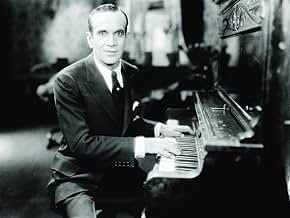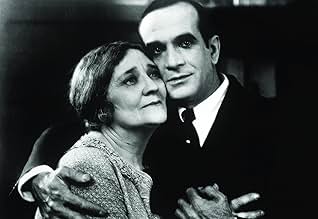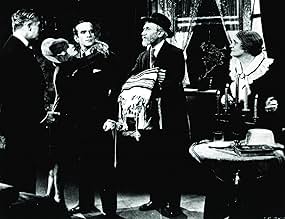Le fils d'un chanteur juif doit défier les traditions de son père religieux afin de réaliser son rêve et devenir chanteur de jazz.Le fils d'un chanteur juif doit défier les traditions de son père religieux afin de réaliser son rêve et devenir chanteur de jazz.Le fils d'un chanteur juif doit défier les traditions de son père religieux afin de réaliser son rêve et devenir chanteur de jazz.
- Nommé pour 1 oscar
- 3 victoires et 1 nomination au total
- Jakie Rabinowitz - Age 13
- (as Bobby Gordon)
- Cantor Rosenblatt - Concert Recital
- (as Cantor Joseff Rosenblatt)
- Chorus Girl
- (uncredited)
- Chorus Girl
- (uncredited)
- Small Part
- (uncredited)
- Choreographer - 'April Follies'
- (uncredited)
- Small Part
- (uncredited)
- Violinist
- (uncredited)
- Small Part
- (uncredited)
- Buster Billings
- (uncredited)
- Dance Director
- (uncredited)
Avis en vedette
This is a powerful story with interesting characters and good songs, to boot. It was different to see Warner Oland as somebody else besides Charlie Chan. He played Jolson's father and I never would have recognized him had I not read the credits. Nor would I have recognized William Demarest.
Jolson, however, is the man who dominates the film. Some of this songs wound up being classics, ones played for years and years, such as "Toot, Toot Toosie" and "Mammy."
Faced with a very tough decision on what to do with his life, Jolson's character does the right thing in the end, which was nice to see. Overall, it's entertaining.
But for trying to hold up the Brothers Warner for some extra salary for doing that first sound feature, Georgie Jessel might have been able to repeat the role he created on Broadway as Jakie Rabinowitz aka Jack Robin, cantor's son who runs away from home as a juvenile and comes back home in time to sing Kol Nidre at Yom Kippur services in place of his dying father. Jessel's greed was Al Jolson's gain as America's greatest live entertainer at the time got to inaugurate the era of movie sound.
As Al Jolson was wont to do in his stage shows, he interpolated material from all sources in his first film that he felt was suitable for him. Toot Toot Tootsie and interestingly enough My Mammy were songs he'd done on stage before and were proved material his audience would respond to. The first song he actually does sing is Dirty Hands, Dirty Face which was something he had not done before. Blue Skies which he sings to his mother after returning home as a Broadway star was in fact a current hit on Broadway at the time Jolson was singing it.
People from that era say that you cannot appreciate Jolson on the screen, that to really get the full impact of his dynamic stage presence you had to see him live. Maybe so, but since that isn't possible, there's enough of him in The Jazz Singer and other of his films to realize what a great entertainer he was, black-face or not.
Warner Oland, later to be the first Charlie Chan, plays Cantor Rabinowitz and Eugenie Besserer is touching as Jolson's mother caught hopelessly between her husband and son. In that first scene of a grownup Jolson in a café before he sings Dirty Hands, Dirty Face you will note that is William Demarest who he's dining with. Myrna Loy has a small role as a chorus girl.
Still both the play and the personality dictate that this film is owned exclusively by Al Jolson. Despite later versions with Danny Thomas and Neil Diamond in the lead, the story will always be identified with the man who said we ain't heard nothing yet.
Though The Jazz Singer is exponentially sentimental and mawkish, it does have a very nice depiction of Jewish life and neighborhood in the Teens and Twenties of the last century. And of course The Jazz Singer is a historic first.
Though, not being the first "talkie", The Jazz Singer, is certainly a remarkable film; it still holds its place as an cinematic landmark for being the first feature-length Hollywood "talke" film in which "spoken dialogue was used as part of the dramatic action." However, it's still largely a silent film with a synchronized musical score and a handful of sound sequences built around singing. It's also become something of a controversial case because of Al Jolson's (arguably the most popular entertainer of his time) use of blackface in some of the musical sequences, forgetful of the fact that this was a theatrical artifice from the era; it wasn't intended as "mean-spirited" as so many claim it to be. It was actually praised by black newspapers in 1927, and was being done by another much defamed minority, a Jew.
You can see what an impact sound must have had in 1927, because it certainly wasn't the movie that made this production a phenomenon. Though, the film itself, is more than just a movie about a guy who likes music. It's also a story about a Jewish kid who turns his back on his heritage to try and make it big on the stage - exceptionally daring subject matter for its era, and still enthralling today. It's certainly not ragged and dull, though, the magic moment when Jolson turns to the camera to announce, "You ain't heard nothing' yet" - a line so loaded with unconscious irony that it still raises a few goose bumps. Audiences were captivated by this and still are to this very day. A must see!!!
Le saviez-vous
- AnecdotesThis is the first feature-length movie with audible dialogue.
- GaffesMary recieves a telegram dated August 8, 1927. Later in the film, Jack is seen writing a letter to Mary, dating it August 7, 1927.
- Citations
[opening lines, first quote and first words in the first widely-seen talking picture]
Jack Robin: Wait a minute, wait a minute, you ain't heard nothin' yet! Wait a minute, I tell ya! You ain't heard nothin'! You wanna hear "Toot, Toot, Tootsie"? All right, hold on, hold on...
[then he walks back to one of the band members]
Jack Robin: Lou, listen. Play "Toot, Toot, Tootsie", three chorus, you understand. In the third chorus, I whistle. Now give it to 'em hard and heavy, go right ahead.
- ConnexionsEdited into Okay for Sound (1946)
- Bandes originalesMy Gal Sal
(1905) (uncredited)
Written by Paul Dresser
Sung by Robert Gordon (dubbed by an unidentified singer)
Meilleurs choix
Détails
Box-office
- Budget
- 422 000 $ US (estimation)
- Durée
- 1h 28m(88 min)
- Couleur
- Rapport de forme
- 1.33 : 1






























